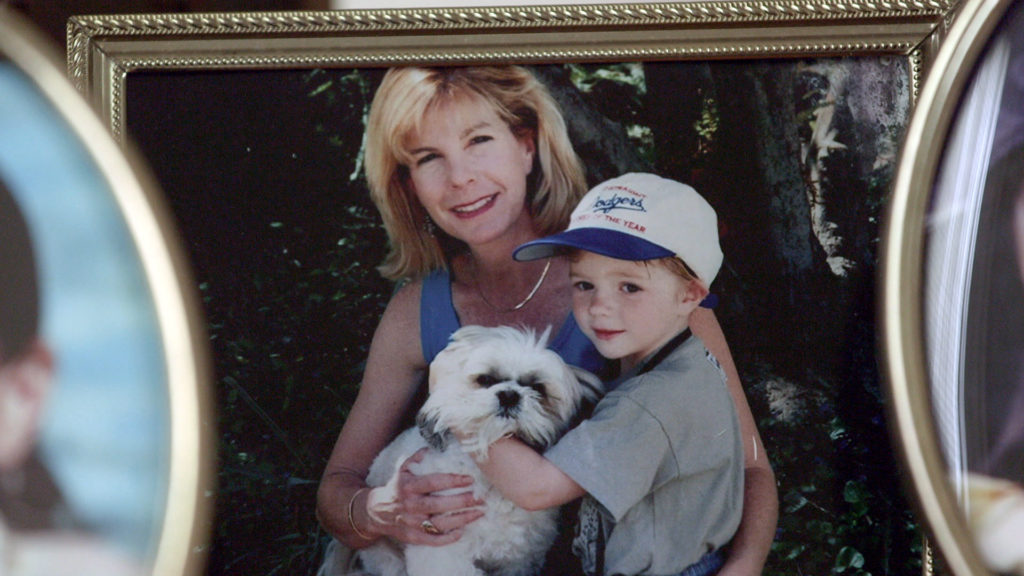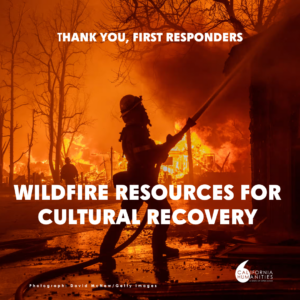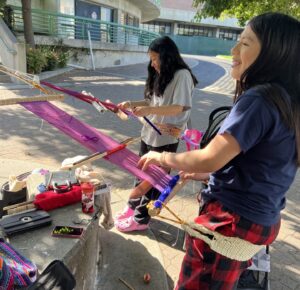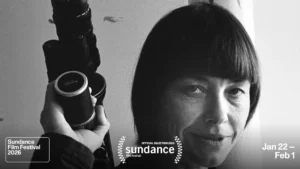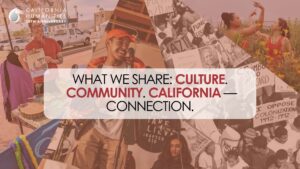As we all get used to spending more time inside, California Humanities is here to keep you connected to ideas, stories, and conversations that help you better understand the human experience. In addition to our commitments to our grantees, and our list of resources for humanities and arts organizations and practitioners, we’ve gathered a list of videos, films, podcasts, online exhibits, interactive websites, and ways to engage with the humanities from your home. Please check back soon, as we’ll be updating this list weekly with more great things to watch, listen to, read, engage with, and enjoy.
Are you a California Humanities grantee whose project is online, and not on this list? Let us know: email communications@calhum.org
Skip to:
Archives, Maps, and Oral Histories
Exhibits
Podcasts
Interviews, Performances, Lectures, and Discussions
Films
Look Through Online Archives, Maps, and Oral Histories
- Check out the community stories and history behind the Commons Archive, a collaborative research project, hyper-local reference collection, and neighborhood memory bank for North Oakland, a neighborhood in transition, supported by a Humanities for All Project Grant.
- Become a remote Citizen Historian for the 1947 Partition Archive, a Humanities for All Quick Grant-supported project sharing the stories of witnesses to the 1947 Partition of South Asia with the broader public. Take a free online oral history workshop and help document the memories of survivors from home.
- Reimagine the Japanese teahouse as a meeting space where people from all walks of life can share stories about belonging and unbelonging with the Rolling Counterpoint archive, supported by a Humanities for All Quick Grant.
- Explore an interactive map of contributions that underrepresented groups have made to Orange County’s art history with Mapping Arts OC, supported by a Humanities for All Quick Grant.
- Take an audio tour of Los Angeles’ Historic Filipinotown with The Chicharrón Chronicles and consider the cultural crossover between Filipino and Latino histories of colonialism and social change in this Humanities for All Project Grant-supported project.
Visit an Online Exhibit
- 1500stories.org is a cooperative art and storytelling project supported by a Humanities for All Project Grant that aims to focus public attention on the chasm between the rich and poor in the US through storytelling and the humanities. Experience an interactive website that marries quantitative data about economic inequality with video, audio, and photo stories of what it is like to live at different economic positions in America.
- Explore California Humanities’ past The Art of Storytelling exhibits series, which celebrates California’s rich cultural and artistic histories and dynamic changing demographics. Multi-generational storytelling and testimonials are articulated in these exhibits through a variety of visual media.
- Go on a virtual tour of Vote! Your Vote is Your Voice/ ¡Vote! Su Voto es Su Voz, a Humanities for All Quick Grant-funded visual art and history exhibit featuring the stories of Monterey Bay residents in historic and current voting rights efforts.
- View striking black-and-white photos of Black farmworker communities in the Central Valley from the 1960s by Ernest Lowe, a project supported by a Community Stories grant.
- Experience a transmedia documentary exploring the social, cultural, and physical landscape of the Mojave Desert: a vast, seemingly remote region spanning 45,000 square miles that paradoxically is considered one of the world’s most urbanized deserts.
- Read dispatches from Straight Outta Fresno: From Popping to B-boying and B-girling, which brought Fresno community members together with Fresno State historians and students to create events focused on the history of hip hop dance and culture in Fresno from the late 1970s to the early 2000s.
- Check out exhibit website for Something from Nothing: Art and Handcrafted Objects from America’s Concentration Camps, a Humanities for All Project Grant which featured handmade artifacts created by Japanese Americans sent to the American concentration camps during WWII, includes educator resources, an object list, a digital collection, and exhibition texts.
- View photos and videos from San Diego’s Little Saigon on the Little Saigon Stories website, a project supported by a Humanities for All Project Grant.
- See videos of oral histories and noticias from Santa Barbara Historical Museum’s exhibit Sacred Art in the Age of Contact, supported by a Humanities for All Project Grant, which explored Spanish influence on Chumash works of religious art from the middle of the 18th century.
- Listen to oral history interview clips from the exhibit Welcome to the Mix: Each of Us Has a Story, at the San Diego History Center, which added 50 new oral histories to the museum’s collection.
Get Into a New Podcast
- Listen to an audio series about the Back to the Land Movement in Mendocino County based on twenty oral histories, supported by a Humanities for All Quick Grant.
- Examine the changing nature of work as told through the experiences of the people doing the labor with California Documentary Project-supported The Specialist.
- Get into the social history and musical variation of the accordion with Squeezebox Stories, supported by a California Documentary Project grant.
- Get the scoop from The Stoop, an award-winning California Documentary Project-funded podcast featuring stories about black identity and examining issues of race and culture among African American and African immigrant communities.
- Contemplate the impact of the Bay Area’s economic boom with The Intersection, a series sound portraits in communities centered around six vastly different street intersections, supported by a California Documentary Project grant.
- Hear deeply with The World According to Sound, a podcast and live performance series produced in partnership with LightHouse Center for the Blind that examines the world through our ears instead of our eyes, created with support from a California Documentary Project grant. Check out daily new sounds they’re releasing—once a month—as we the shelter-in-place.
- Get political with California’s longest-serving Governor, in an intimate documentary interview series between him and KQED’s Scott Shafer, The Political Mind of Jerry Brown, supported by a California Documentary Project grant.
- Whet your appetite with California Documentary Project-supported California Foodways, a radio and web series documenting the stories of food and the lives and culture of the people who produce it throughout the state of California.
- Listen in to a series of three professionally-produced audio stories highlighting a person, place, and history from each of the eight distinct communities along the Russian River, as part of The Wonderland Radio Hour, supported by a Humanities for All Project Grant.
- Explore the past, present, and future of a post-industrial brownfield on the banks of the LA River through the experiences of the communities that cherish it, including youth, railyard works and graffiti artists, in South of Fletcher: Stories from the Bowtie Podcast, a Humanities for All Quick Grant-supported project.
- Listen in to a new podcast by, about, and for teenagers, tbh: Representing The Voices of A Generation, supported by a CDP NextGen grant, where they address what’s on their minds: How can we change the world with our activism? With our commerce? With our culture?
Dig Deep With an Interview, Performance, Lecture, or Discussion
- Check out Fighting Back, an online forum from the San Francisco GLBT Historical Society with veteran LGBTQ activists discussing how past struggles during the AIDS epidemic may help us understand and respond to COVID-19. The first two webinar took place on April 1; watch the recording here.
- Join a virtual live panel, Our Communities and Climate Change, conducted by the Oakland Asian Cultural Center on April 19 from 1 to 2:30 pm.
- Hear a group of prominent Californians explore what the humanities mean to them with the We Are the Humanities project. We invite you to watch, listen, and read as they dig into the deep importance of the humanities in shaping their lives and understanding the world.
- View interviews and recordings of community conversations recordings of veterans and their families, writers, and historians as they for thoughtfully reflect and discussion in the aftermath of war as a part of California Humanities’ War Comes Home initiative.
- Watch a recording of Zaccho Dance Theatre’s interdisciplinary, site-specific performance Picture Bayview Hunters Point, focused on the dreams and aspirations of local residents as a San Francisco neighborhood undergoes a period of economic and demographic change, supported by a Humanities for All Quick Grant.
- See a lecture by Shaping San Francisco that draws on themes from their participatory community history digital archive, FoundSF.org.
- View a nine-part series of filmmaker panel discussions and oral histories on From Latin America to Hollywood: Latino Film Culture in Los Angeles, 1967–2017, by the Academy of Motion Picture Arts and Sciences, supported by a Humanities for All Project Grant.
- See a full-length interview with writer Rebecca Solnit as she discusses her book A Paradise Built in Hell: The Extraordinary Communities That Arise in Disaster, focused on how in times of crisis, humans show themselves to be deeply communitarian, altruistic, brave, and improvisational, for California Humanities’ 2012 California Reads program, part of our Searching for Democracy initiative.
- Explore what discoveries and lessons lie in works of fiction and nonfiction, provocative cultural exhibits, and public conversations in more of our Searching for Democracy videos, which document forums and discussions.
- Access video, media, and other resources from On the Road with California Humanities, a series featuring Pulitzer Prize winners in dialogue with notable thinkers and the community, as part of the national Campfire initiative celebrating the 100th anniversary of the Pulitzer Prizes.
Watch a Film for Free
- LOST TREASURE HUNT, a series of half-hour episodes, uses a unique combination of live-action documentary and animation to explore different multicultural topics in California with age-appropriate material for elementary school children. The series combines elements of mystery and detective work in documentary style that young viewers will consider original and contemporary.
- Join your local California public library and sign up for Kanopy to get access to great films like REAL BOY, supported by a California Documentary Project grant, which follows 19-year-old Bennett and his mom through the first two years of gender transition.
- Also available on Kanopy is BRIDGING THE DIVIDE: TOM BRADLEY AND THE POLITICS OF RACE—supported by a California Documentary Project grant—which follows the story of a young Angeleno who bridged the racial divide to become the first black mayor elected in a city with an overwhelmingly white majority.
- Don’t miss UNITED SKATES, about the dynamic world of roller skating, showcasing African American rinks across California and the United States, streaming for free on HBO.
- Check out Oscar-nominated short film WALK RUN CHA-CHA, supported by a California Documentary Project grant, about a couple who lost their youth to the aftermath of the Vietnam War and rediscover themselves 40 years later on the dance floor, for free on the New York Times’ Op Docs website.
- Catch free short films about groundbreaking women in American history, released weekly on Wednesdays through August, as a part of the UNLADYLIKE2020 project, supported by a California Documentary Project grant.
- Check out CDP NextGen grantee Reel Stories’ recent premiere #TeensToo on their YouTube channel, and don’t miss their daily schedule of online programming for teens and their families.
- Don’t miss ambitious multimedia project Loyalty: Stories, focused on American Muslims who have put their lives on the line for our country, supported by a Community Stories grant.
- Watch a short documentary about the history of cattle ranching in Central California, with stories gathered from ranchers, environmentalists, Native peoples, and land and resource management specialists: Head ‘Em Up, Move ‘Em Out.
Support Filmmakers by Streaming These Projects
- Follow 23-year-old poet, playwright, educator, and activist Donté Clark from Richmond, as he develops an urban adaptation of Romeo and Juliet in an effort to address violence in his hometown in ROMEO IS BLEEDING, supported by a California Documentary Project grant.
- Community Stories-supported film No Place to Grow follows a group of Latino farmers in Santa Cruz who find themselves representing a movement to save the last green space centered within a neighborhood facing gentrification.
- Learn about the female chief justices of California’s two largest tribes, Yurok and Quechan, who are working to reintroduce traditional cultural values back into the courtroom in TRIBAL JUSTICE, supported by a California Documentary Project grant.
- Follow the Black punk/funk band Fishbone from their roots in South Central Los Angeles to almost “making it,” in EVERYDAY SUNSHINE, a California Documentary Project-supported film available to stream on Amazon.
- Check out UNITED SKATES, a California Documentary Project-supported character-driven film explores the rich history and culture of roller skating in African American communities across the United States.
- Look back at the impact of the AIDS epidemic in WE WERE HERE: Voices from the AIDS Years in San Francisco, supported by a California Documentary Project grant.
- Learn how a chance encounter in 1975 between 20 Vietnamese women and actress Tippi Hedren at a refugee camp in California led to the founding of what would eventually be a multibillion-dollar industry in #NAILEDIT, supported by a California Documentary Project grant.
- Trace the journey of the youth who attended Camp Jened—a summer camp for disabled teenagers—from the 1960s and 70s summer awakenings to their leading roles in the contemporary disability rights movement in CRIP CAMP, a California Documentary Project-supported film that took home the Audience Award for US Documentary at Sundance.
Are you a California Humanities grantee whose project is online, and not on this list? Let us know: email communications@calhum.org

